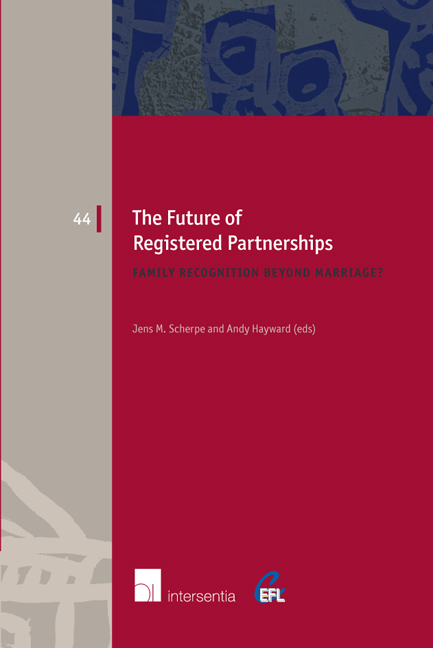Book contents
- Frontmatter
- Foreword
- Preface
- Contents
- List of Contributors
- The Future of Registered Partnerships: An Introduction
- Questionnaire
- Part I Registered Partnerships as a Functional Equivalent to Marriage
- Registered Partnerships in Denmark
- Registered Partnerships in Norway
- Registered Partnerships in Sweden
- Registered Partnerships in Iceland
- Part II Registered Partnerships as an Alternative to Marriage
- Part III Registered Partnerships in a Time of Transition
- Part IV Alternative Models for Registered Partnerships: Beyond Conjugality, Beyond Formality
- Part V Registered Partnerships, Discrimination and Human Rights
- Part VI Comparative Perspective and Conclusions
- Index
- European Family Law Series
Registered Partnerships in Iceland
from Part I - Registered Partnerships as a Functional Equivalent to Marriage
Published online by Cambridge University Press: 22 September 2018
- Frontmatter
- Foreword
- Preface
- Contents
- List of Contributors
- The Future of Registered Partnerships: An Introduction
- Questionnaire
- Part I Registered Partnerships as a Functional Equivalent to Marriage
- Registered Partnerships in Denmark
- Registered Partnerships in Norway
- Registered Partnerships in Sweden
- Registered Partnerships in Iceland
- Part II Registered Partnerships as an Alternative to Marriage
- Part III Registered Partnerships in a Time of Transition
- Part IV Alternative Models for Registered Partnerships: Beyond Conjugality, Beyond Formality
- Part V Registered Partnerships, Discrimination and Human Rights
- Part VI Comparative Perspective and Conclusions
- Index
- European Family Law Series
Summary
BACKGROUND
At present, legislation in Iceland provides for two basic structures governing adult relationships. One is marriage, which is governed by the Law in Respect of Marriage No. 31/1993 (Marriage Act 1993) with later amendments. The other one is cohabitation which is oft en (but not always, as sometimes the legal consequences are attached to de facto cohabitation) established by a simple notification to the National Registry, with no other specific formalities. Cohabitation is not governed by a single legal Act, but rather there are certain legal effects attached to it provided for in various statutes, including for example the Act on Children No. 76/2003, the Adoption Act No. 130/1999, the Act on Artificial Fertilisation and use of Human Gametes and Embryos for Stem-Cell Research, No. 55/1996, as well several other legal Acts, mainly in the field of social security.
The Marriage Act 1993 since 2010 has been gender-neutral and applies equally to opposite-sex couples and same-sex couples with the same legal effects in all respects, except for those provisions which specifically refer to the gender of the partner. Article 1 of the Marriage Act, after changes made by Act No. 65/2010, expressly states that the law shall apply to the union of two persons in matrimony. Article 1 also makes clear that the Marriage Act 1993 shall not apply to cohabitation of unmarried persons. This means, although some legal effects of registered or de facto cohabitation are similar to those of marriage, that there are in other respects important and significant differences as regards the legal substance and consequences between these two institutions, as is explained below.
In the period 1996 – 2010 Act No. 87/1996 created a further form of formalised adult relationship, which generally has been translated into English as registered partnership. This Act, which is discussed further below, applied only to same-sex couples. After marriage was opened up to same-sex couples in 2010 and became completely gender-neutral, the Act on Registered Partnerships was repealed, as it was felt that there was no need for it any more. There are, however, transitional provisions allowing those who have entered into registered partnership to continue to do so if that is their wish. The description of the Act on Registered Partnerships below therefore mostly is of historical interest.
- Type
- Chapter
- Information
- The Future of Registered PartnershipsFamily Recognition Beyond Marriage?, pp. 101 - 118Publisher: IntersentiaPrint publication year: 2017

